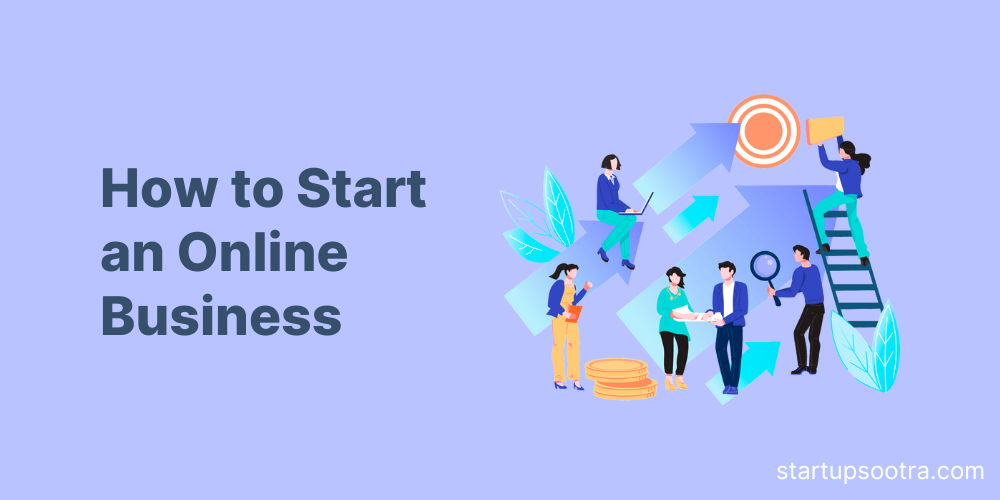In today’s era, starting an online business is as easy as it is on the one hand, but on the other hand, it also brings with it the same number of challenges. On the one hand, the Internet offers easy access to a global audience, low-cost marketing options, and the flexibility to work from anywhere, on the other hand, competition is fierce, and standing out in a crowded marketplace can be challenging.
Here I’ve outlined how to analyze market segments, build websites, curate products, craft marketing plans, track analytics, and beyond, to help you launch your successful online venture. So stay tuned till the end of this guide.
Let’s get started:
What exactly is an online business?
Online business refers to any business enterprise that operates primarily through the Internet. It involves conducting various business activities such as selling products or services, communicating with customers, and managing transactions through online platforms. Online businesses leverage the Internet as the primary medium for their operations, allowing them to reach global audiences, reduce geographic boundaries, and leverage digital technologies for marketing, sales, and customer engagement.
Why Start an Online Business?
Starting online businesses has become very popular in today’s digital world. There are several significant reasons behind this trend. Firstly, it allows you to reach a wide audience, operate your business from anywhere in the world, and is accessible for anyone to start. Initiating an online business is relatively easy, and it’s a fast process. Moreover, there are many other compelling reasons to venture into the online business sphere. Additionally, the costs of starting an online business are significantly lower than those of a traditional brick-and-mortar business. With the rise of e-commerce and digital marketing, now is an opportune time to consider launching your own online business.
Steps to Start Your Online Business
Here are 12 easy steps to start your online business from home. I have covered finding ideas, planning, execution, marketing, and expansion.
1. Find Your Business Idea
The first and most important thing while starting any new business is to choose the right online business idea for you. For your business to start successfully and grow in the future, it is important that you work on a less competitive idea, that has more demand, interests you, and about which you have knowledge and some experience. Along with this, you also have to see that it is problem-solving, scalable, and profitable.
Defining your target customer avatar is also important as it allows you to tailor your products or services to meet their specific needs and preferences. By understanding your ideal customer, you can develop more effective marketing strategies and build stronger relationships with them.
2. Market Research and Validation
After making a list of 3 – 5 business ideas, the most important step is to conduct market research and validate your idea. After this step, you get your final business idea that you are going to work on.
To ensure success for your business, actively staying updated on your target audience and industry trends is crucial. Validating your ideas early by surveying potential customers can save time and resources in the long run. This feedback can provide insights into what your targeted viewers want and need, allowing you to tailor your offerings accordingly.
Continuous research into competitors and industry developments is imperative to stay ahead in the market. This grants a superior grasp of market demands, new advancements, and emerging technologies. Moreover, such knowledge can aid in crafting more impactful marketing campaigns that resonate with your intended audience. Accounting for these factors, you can enhance your overall business performance and maintain a competitive edge in the marketplace.
Now that the significance of understanding your customers and industry is clear, delving deeper into business planning can provide a roadmap to turn these ideas into reality. Structuring company objectives, crafting budgets and projections, and devising contingencies are pivotal next steps covered under planning.
3. Business Planning
When kicking off a startup, laying the right groundwork gets you set up for success down the road. Start by clearly defining your vision and goals—what issues do you want to solve? Who are you helping? Get crystal clear on your mission and intended impact.
Map out concrete objectives and how you’ll measure progress. Don’t forget to handle key admin tasks too like registering your business properly, getting accounting and legal ducks in a row, and nailing licensing and compliance details. Having the right business structure and foundations prevents major headaches later!
The execution planning is where the magic happens. Project your funding needs, model out worst and best-case scenarios, and build adaptable systems to support sales, production, and delivery at scale. Fail to plan = plan to fail, so do it right!
Before any flashy launch, devise a soft opening strategy—test concepts via surveys, develop minimum viable products to validate assumptions, and get real user feedback so you can tweak and improve. When launch day finally arrives, view it as a process rather than an event. Have backup inventory/tech support prepped for demand. Collect feedback, and keep optimizing. Success comes from the continual honing of great ideas into sustainable ventures delivering value.
4. Financial Planning
Money matters can’t be an afterthought! Let’s dive into building projected cash flow statements, Income statements, and other must-have financial models to secure ample funding for your vision.
We’ll also analyze breakeven points to intelligently guide pricing decisions. Regularly reviewing actuals against budgets enables prudently steering the fiscal ship. Having sound accounting principles cemented early allows smooth scaling later.
5. Website & Branding
First impressions matter big time! A professional website establishes credibility while conveying your unique value. We’ll ensure your branding and messaging inspire trust and resonate with your audience.
Careful design considerations like an intuitive user experience and visually appealing aesthetic leave memorable impacts. Driving qualified traffic requires honing search engine optimization fundamentals. Let’s craft an online home converting visitors into delighted customers!
6. Registration & Legal Formalities
We’ve got that, let’s focus on the key legal and compliance items! Choosing the appropriate business registration for your structure lays the foundation for success. Obtaining necessary licenses, permits, and tax IDs ensures operation above board.
Engaging accountants and lawyers helps to fully maximize the opportunities and incentives available to you.
7. Product Development
Now for the good stuff! Truly understanding your customers’ needs helps create offerings that provide incredible value. We will maintain quality standards through checking of suppliers and components. Constantly optimizing inventory levels and order fulfillment processes balances demand with resources.
Delighting people by consistently delivering on promises leads to referrals and loyalty that any marketer would envy! Let’s create amazing public moments that get people talking.
8. Marketing & Traffic
Exposure is essential yet not all eyes are equal. Let’s attract and retain high-quality visitors by employing diverse digital strategies tailored to your audience. Building email lists informs and nurtures contacts through the conversion journey.
Search engine optimization expands organic reach into new territories. Social media and select advertising concentrates impressions among promising segments. Driving qualified traffic to your digital properties pays dividends now and especially later.
9. Sales and Optimizing Conversion
We’ve set the table beautifully, now let’s convert interest into real dollars! Ensuring ease of use and seamless user experiences keeps visitors transacting versus bouncing.
Strategically offering promotions or exclusive loyalty benefits helps too. Retargeting past prospects reminds them of unfinished business worth returning for! Recommending complementary upsells makes it effortless for customers to spend more. Optimizing conversion touchpoints translates lookers into buyers, building a healthy recurrent revenue engine!
10. Analytics for Growth
Turning curiosity into understanding guides smart decisions. Let’s instill key metrics allowing us to slice-and-dice what’s working and what’s not.
Monitoring user flows and conversions identifies points losing people for quick fixes. A/B testing ideas faster gets us to what maximizes outcomes faster using real data. Continually listening to usage data and fine-tuning based on insights measured separates market winners from also-rans!
11. Customer Support
Businesses relying solely on transactions often have short futures. Let’s build genuine connections and goodwill! Responding quickly to questions and reviews earns trust and loyalty beyond payments. We’ll delight users by steadily anticipating needs, communicating clearly and exceeding expectations.
Again, embedding support workflows early establishes reputation and culture difficult altering later. When people feel prioritized, they pay it forward via referrals.
12. Scaling the Business
The longest journeys start with single steps before eventually crossing the finish line. We’ve laid foundational elements for structuring sustainable models. As progress unfolds, we’ll revisit vision frequently to ensure alignment as activities expand.
Building capable teams and networks provides insights from experience. Staying nimble to outmaneuver challenges reveals new opportunities. Now let’s prepare infrastructure supporting 10x growth when the time comes.
Exploring the Advantages of Online Businesses
Recent years have seen immense growth in online businesses like app development and e-commerce, offering lucrative opportunities for entrepreneurs. Digital marketing strategies and strong YouTube presence enable global outreach cost-effectively. Optimizing search engine results via Google Ads expands customer reach. Lower startup costs and remote work flexibility allows testing innovative ideas.
i) Cost-Effectiveness
Online businesses offer immense cost savings, eliminating expenses like rent and utilities. Minimal inventory and no need for physical stores lowers operational costs significantly. Reaching worldwide audiences is achievable at a fraction through targeted digital marketing versus traditional advertising. Process automation further maximizes productivity.
ii) Flexibility
Managing your own online business allows accommodating personal commitments flexibly alongside work by leveraging remote access. This promotes work-life balance while still tending your venture on the move. You have the freedom to explore niche concepts adapting swiftly to market changes. Recent app and e-commerce growth offers abundant possibilities to pursue your own successful online business.
iii) Global Accessibility
E-commerce platforms and innovative apps allow online businesses to tap into diverse global customer bases beyond geographical limitations. Social media and YouTube showcase offerings internationally. Targeted digital marketing techniques efficiently attract worldwide potential customers. The internet’s global connectivity has been transformative for market reach.
Steps Before Launching
Taking strategic steps to prepare sets up online businesses for effective debuts. Here I have pointed out some important steps that you should take before launching your online business.
- Research market trends and customer behavior to identify promising opportunities
- Develop a business plan outlining strategy, target users, and marketing
- Build online presence via social media and content marketing
- Choose a memorable brand name and domain
- Create a polished website showcasing your online business concept
- Robust preparation enables a successful launch
Overcoming Competitive Challenges
Standing out against the rise of e-commerce requires strategic marketing and adaptation. Maintaining customer trust through excellent service also distinguishes your business. Recent approaches like YouTube channel marketing and creative side hustles effectively combat competition.
i) Handling Competition
Employing a combination of sustained strategies enables online businesses to thrive amid mounting competition, including:
- Continuously monitor competitor strategies to pinpoint market trends
- Innovate and improve offerings to stay relevant
- Build unique brand identity and online presence
- Provide exclusive value propositions
- Pursue mutually beneficial partnerships
ii) Customer Trust
Winning ongoing trust and confidence from users bolsters the longevity of online businesses through tactics like:
- Establish trust through consistent, reliable service
- Inspire confidence by transparency in business operations
- Effective, timely communication nurtures loyalty
iii) Adapting to Changes
Readiness to adapt and evolve sustains the health of online businesses by:
- Conduct ongoing market research to facilitate adaptation
- Remain flexible to update strategies quickly
- Stay updated with trends to maintain a competitive edge
- Embrace innovation and change to drive resilience
Conclusion
Navigating the dynamic realm of online entrepreneurship demands a keen understanding of its dual nature. While the internet grants global access, low-cost marketing, and remote work flexibility, it also poses fierce competition. From market analysis to website creation, product curation, and marketing plans, we’ve covered the essentials to launch and sustain your online venture successfully.
To succeed, grasp the advantages – cost-effectiveness, flexibility, and global reach. Before launching, prepare strategically: research market trends, craft a robust business plan, build an online presence, and choose a memorable brand name. Overcoming competition involves innovation, unique branding, and fostering customer trust.




